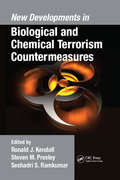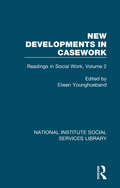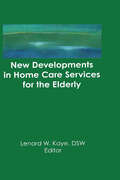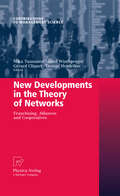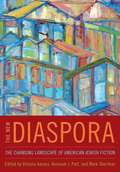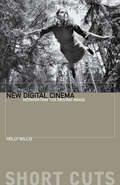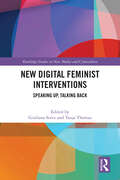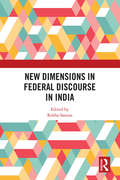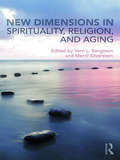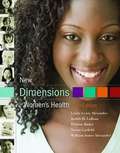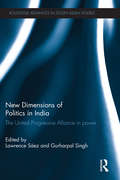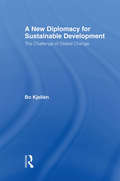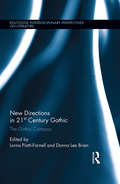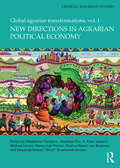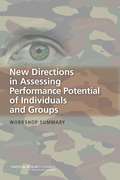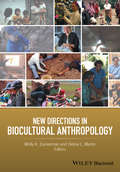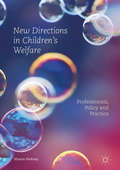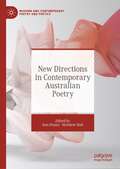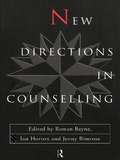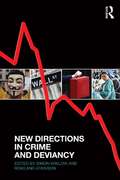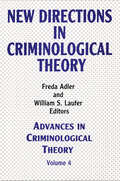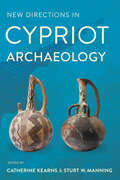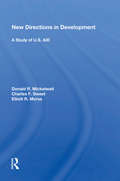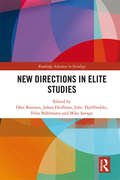- Table View
- List View
New Developments in Biological and Chemical Terrorism Countermeasures
by Ronald J. Kendall; Steven M. Presley; Seshadri S. RamkumarA science-based text, New Developments in Biological and Chemical Terrorism Countermeasures presents research that addresses the growing threat of chemical and biological terrorism as well as the need for improvements in the implementation of countermeasures. This new textbook building upon Advances in Biological and Chemical Terrorism Countermeasu
New Developments in Casework: Readings in Social Work, Volume 2 (National Institute Social Services Library)
by Eileen YounghusbandOriginally published in 1966, this book gives examples of the most advanced thought about casework by well-known writers in England and the United States at the time. The ground covered includes: the use of some current sociological theory in casework; analysis of the interpersonal relationships in casework; new thought about the appropriate use of authority with people whose own internal controls are weak and unreliable; and recent advances in understanding and working with people who respond to action more easily than to words. These articles by well-known authorities illustrate the increased range of insight and skill required of modern caseworkers, and at the same time are highly readable, conveying complex ideas in language refreshingly free from jargon.
New Developments in Home Care Services for the Elderly: Innovations in Policy, Program, and Practice
by Lenard W KayeThis anthology responds to the recurring call for quality in home care service provision. It presents to agency administrators, managers, supervisors, and front line service providers a set of the most up-to-date policy, program, and practice developments in the field. Each contributor to New Developments in Home Care Services for the Elderly explores issues of client/staff diversity and the challenges associated with working with clients grappling with disabling conditions.Contributors in New Developments in Home Care Services for the Elderly explore issues of client/staff diversity and the challenges associated with working with clients grappling with various disabling conditions. Topics addressed include: alternative organizational models in home care the importation of high technology services into the home legal and ethical issues in home health care counseling homebound clients and their families clinical assessment tools and packages case management and the home care client home care entitlements and benefits evaluating and monitoring the effectiveness of in-home care marketing home health care services home care service experiences in other countriesNew Developments in Home Care Services for the elderly covers a continuum of care ranging from housekeeping services to self-care education, teaching, and training services to nursing and medically related services. Consequently, the information contained within this volume is of immediate relevance to a multidisciplinary audience having both direct (field) and indirect (office) service responsibilities in the home care organization. Social workers, nurses, business administrators, and public health professionals will find this an invaluable guide for providing effective home care services.
New Developments in the Theory of Networks
by Gérard Cliquet Mika Tuunanen George Hendrikse Josef WindspergerThe theory of networks aims at developing theoretical views on the design and management of alliances, franchise chains, licensing, joint ventures, cooperatives, and venture capital relations. The current trend in economics and management of networks is twofold: First there is a strong tendency toward application of theoretical approaches developed both in organizational economics, strategic management and organization theory. The second trend refers to the development of more integrative views on networks. Especially, combining organizational economics, strategic management and relational views on networks are very promising research directions. Starting from this status of research, the current book emphasizes network research as a theory-driven field by offering new perspectives on contract design, decision and ownership rights, value creation, knowledge management and the role of social capital in franchising networks, alliances and cooperatives.
The New Diaspora: The Changing Landscape of American Jewish Fiction
by Mark Shechner Avinoam J. Patt Victoria AaronsThe Edward Lewis Wallant Award was founded by the family of Dr. Irving and Fran Waltman in 1963 and is supported by the University of Hartford's Maurice Greenberg Center for Judaic Studies. It is given annually to an American writer, preferably early in his or her career, whose fiction is considered significant for American Jews. In The New Diaspora: The Changing Landscape of American Jewish Fiction, editors Victoria Aarons, Avinoam J. Patt, and Mark Shechner, who have all served as judges for the award, present vital, original, and wide-ranging fiction by writers whose work has been considered or selected for the award. The resulting collection highlights the exemplary place of the Wallant Award in Jewish literature. With a mix of stories and novel chapters, The New Diaspora reprints selections of short fiction from such well-known writers as Rebecca Goldstein, Nathan Englander, Jonathan Safran Foer, Dara Horn, Julie Orringer, and Nicole Krauss. The first half of the anthology presents pieces by winners of the Wallant award, focusing on the best work of recent winners. The New Diaspora's second half reflects the evolving landscape of American Jewish fiction over the last fifty years, as many authors working in America are not American by birth, and their fiction has become more experimental in nature. Pieces in this section represent authors with roots all over the world--including Russia (Maxim Shrayer, Nadia Kalman, and Lara Vapnyar), Latvia (David Bezmozgis), South Africa (Tony Eprile), Canada (Robert Majzels), and Israel (Avner Mandelman, who now lives in Canada). This collection offers an expanded canon of Jewish writing in North America and foregrounds a vision of its variety, its uniqueness, its cosmopolitanism, and its evolving perspectives on Jewish life. It celebrates the continuing vitality and fresh visions of contemporary Jewish writing, even as it highlights its debt to history and embrace of collective memory. Readers of contemporary American fiction and Jewish cultural history will find The New Diaspora enlightening and deeply engaging.
New Digital Cinema: Reinventing the Moving Image (Short Cuts)
by Holly WillisThis introduction to contemporary digital cinema tracks its intersection with video art, music video, animation, print design and live club events to create an avant-garde for the new millennium. It begins by investigating digital cinema and its contribution to innovations in the feature-film format, examining animation and live-action hybrids, the gritty aesthetic of the Dogme 95 filmmakers, the explosions of frames within frames and the evolution of the ‘ambient narrative’ film. This study then looks at the creation of new genres and moving-image experiences as what we know as ‘cinema’ enters new venues and formats.
New Digital Feminist Interventions: Speaking Up, Talking Back (Routledge Studies in New Media and Cyberculture)
by Giuliana Sorce Tanja ThomasThis volume proposes “speaking up” and “talking back” as new theoretical access points for studying feminist activism in digital spaces.Drawing on the influential work of bell hooks, it highlights social justice interventions by feminist/queer/decolonial actors, groups, and collectives who recover the digital as a space for activist organizing and campaigning. In presenting a variety of sociocultural issues, such as gender violence, queer discrimination, or migrant hostility, the book centers empowerment practices in their digital forms, showcasing interventions in Asia, Europe, and the Americas—thereby critically examining the conditions for marginalized voices to speak up, talk back, and be heard in digital publics. In focusing on activist practices, formats, experiences, and scholarship, the contributions analyze many facets of digital feminist contention, including resistance storytelling, hashtag activism, grassroots journalism, or diaspora podcasting.This international and interdisciplinary volume will interest students and scholars of Media and Communication, Social Movements and Activism, Cultural Studies, Gender and Queer Studies, and Race and Ethnicity.
New Dimensions in Federal Discourse in India
by Rekha SaxenaThis book explores hitherto unaddressed dimensions in federalism studies in India. It traces continuities and changes in Indian federalism since independence and especially economic liberalization. Beginning with the 1990s, due to the emergence of multi-party system, coalition governments, change in judicial temper and the onset of privatization and globalization in the economy, there has been a trend towards greater federalization in India. However, in the context of one-party majority in a coalition government since 2014, new aspects have emerged in Indian federalism. The volume engages with several facets of federalism: administrative federalism; environmental and resource federalism; changing dynamics of fiscal federalism; and multi-level governance. With comparative data and case studies across different states of India, it brings together a range of issues, including Article 356 and its dysfunctions; land acquisition; decentralized governance; tribal rights; the roles of central and state governments; concerns regarding Citizenship Amendment Act; recent abrogation of Article 370 and 35 A; Delhi and statehood; climate change; MGNREGA; implementation of ICDS and the cooperative and competitive nature of Indian federalism. Comprehensive and topical, this book will be useful to scholars and researchers of political science, federalism, comparative federal studies, political studies, comparative politics, public administration, governance and development studies. It will also interest policy makers, bureaucrats, government organizations, NGOs, and civil society activists.
New Dimensions in Spirituality, Religion, and Aging: Neglected Aspects Of Human Development
by Vern L Bengtson Merril SilversteinNew Dimensions in Spirituality, Religion, and Aging expands the traditional focus of religiosity to include and evaluate recent research and discoveries on the role of secular spirituality in the aging process. Contributors examine the ways conventional religion and other forms of spirituality affect human development, health and longevity, and they demonstrate how myth-creation enables humans to make meaning in their lives. Taken together, the book points to further research to enhance current knowledge, approaches to care, and social policies.
New Dimensions in Women's Health (5th Edition)
by Linda Lewis Alexander Judith H. Larosa Helaine Bader William Alexander Susan GarfieldNew Dimensions in Women's Health, Fifth Edition, offers a practical approach to understanding the health of women--all races, ethnicities, socioeconomic status, cultures, and orientations. Objective and data-driven, the Fifth Edition provides solid guidance for women to optimize their well-being and prevent illness and impairment. Each chapter of this book comprehensively reviews an important dimension of a woman's general health and examines the contributing epidemiological, historical, psychosocial, cultural/ethical, legal, political, and economic influences. Click here to make your transition to the new edition even easier!
New Dimensions of Politics in India: The United Progressive Alliance in Power (Routledge Advances in South Asian Studies)
by Gurharpal Singh Lawrence SáezFollowing India’s general election in May 2009, this book undertakes a critical evaluation of the performance of the United Progressive Alliance (UPA). It presents a thorough analysis of the UPA coalition government, and by providing an understanding of the new innovations in the UPA’s policies, the book goes on to evaluate the effectiveness of these policies against their aims and objectives. This book suggests that there is an analytical framework for assessing the political consequences of the policies and the UPA’s success, both at the national and state levels, with particular reference to new policies in governance, secularism and security. These three areas constitute important fault lines between the main national political parties in India, and provide an interesting point of departure to explore the new emerging trends, as well as the strong underlying continuities between the UPA administration and its predecessors. The book offers new insights into the structure of Indian politics, and is a useful contribution to studies in South Asian Politics, Governance and Political Parties.
A New Diplomacy for Sustainable Development: The Challenge of Global Change (Routledge/SEI Global Environment and Development Series)
by Bo KjellénAccelerating, human-induced changes in global natural systems, with global warming as a prime example, are modifying international relations. Diplomacy has to recognize that new types of threats will require new solutions and a new spirit of cooperation. This is a gradual process; traditional conflicts will continue to haunt the international system and traditional methods of diplomatic work still prevail. Based on forty years of experience in multilateral negotiations as former diplomat and international negotiator, the author has developed the concept of a New Diplomacy for Sustainable Development. The book develops the theoretical foundations of the concept and links it to the notion of enabling conditions, describing the close linkages between domestic policies and international negotiations. In conclusion, Kjellén comments on present negotiation processes and offers ideas for institutional reform of the international system.
New Directions in 21st-Century Gothic: The Gothic Compass (Routledge Interdisciplinary Perspectives on Literature)
by Lorna Piatti-Farnell Donna Lee BrienThis book brings together a carefully selected range of contemporary disciplinary approaches to new areas of Gothic inquiry. Moving beyond the representational and historically based aspects of literature and film that have dominated Gothic studies, this volume both acknowledges the contemporary diversification of Gothic scholarship and maps its changing and mutating incarnations. Drawing strength from their fascinating diversity, and points of correlation, the varied perspectives and subject areas cohere around a number of core themes — of re-evaluation, discovery, and convergence — to reveal emerging trends and new directions in Gothic scholarship. Visiting fascinating areas including the Gothic and digital realities, uncanny food experiences, representations of death and the public media, Gothic creatures and their popular legacies, new approaches to contemporary Gothic literature, and re-evaluations of the Gothic mode through regional narratives, essays reveal many patterns and intersecting approaches, forcefully testifying to the multifaceted, although lucidly coherent, nature of Gothic studies in the 21st Century. The multiple disciplines represented — from digital inquiry to food studies, from fine art to dramaturgy — engage with the Gothic in order to offer new definitions and methodological approaches to Gothic scholarship. The interdisciplinary, transnational focus of this volume provides exciting new insights into, and expanded and revitalised definitions of, the Gothic and its related fields.
New Directions in Agrarian Political Economy: Global Agrarian Transformations, Volume 1 (Critical Agrarian Studies)
by Madeleine Fairbairn, Jonathan Fox, S. Ryan Isakson, Michael Levien, Nancy Lee Peluso, Shahra Razavi, Ian Scoones, Kalyanakrishnan “Shivi” SivaramakrishnanHow relevant are the classic theories of agrarian change in the contemporary context? This volume explores this question by focusing upon the defining features of agrarian transformation in the 21st century: the financialization of food and agriculture, the blurring of rural and urban livelihoods through migration and other economic activities, forest transition, climate change, rural indebtedness, the co-evolution of social policy and moral economies, and changing property relations. Combined, the eleven contributions to this collection provide a broad overview of agrarian studies over the past four decades and identify the contemporary frontiers of agrarian political economy. In this path-breaking collection, the authors show how new iterations of long evident processes continue to catch peasants and smallholders in the crosshairs of crises and how many manage to face these challenges, developing new sources and sites of livelihood production.This volume was published as part one of the special double issue celebrating the 40th anniversary of the Journal of Peasant Studies.
New Directions in Assessing Performance Potential of Individuals and Groups
by National Research Council Division of Behavioral and Social Sciences and Education Committee on Measuring Human Capabilities: Performance Potential of Individuals and Collectives Board on Behavioral, Cognitive, and Sensory Sciences Robert PoolAs an all-volunteer service accepting applications from nearly 400,000 potential recruits annually from across the U.S. population, the U.S. military must accurately and efficiently assess the individual capability of each recruit for the purposes of selection, job classification, and unit assignment. New Directions for Assessing Performance Potential of Individuals and Groups is the summary of a workshop held April 3-4, 2013 to examine the future of military entrance assessments. This workshop was a part of the first phase of a larger study that will investigate cutting-edge research into the measurement of both individual capabilities and group composition in order to identify future research directions that may lead to improved assessment and selection of enlisted personnel for the U.S. Army. The workshop brought together scientists from a variety of relevant areas to focus on cognitive and noncognitive attributes that can be used in the initial testing and assignment of enlisted personnel. This report discusses the evolving goals of candidate testing, emerging constructs and theory, and ethical implications of testing methods.
New Directions in Biocultural Anthropology
by Molly K. Zuckerman Debra L. MartinBiocultural or biosocial anthropology is a research approach that views biology and culture as dialectically and inextricably intertwined, explicitly emphasizing the dynamic interaction between humans and their larger social, cultural, and physical environments. The biocultural approach emerged in anthropology in the 1960s, matured in the 1980s, and is now one of the dominant paradigms in anthropology, particularly within biological anthropology. This volume gathers contributions from the top scholars in biocultural anthropology focusing on six of the most influential, productive, and important areas of research within biocultural anthropology. These are: critical and synthetic approaches within biocultural anthropology; biocultural approaches to identity, including race and racism; health, diet, and nutrition; infectious disease from antiquity to the modern era; epidemiologic transitions and population dynamics; and inequality and violence studies. Focusing on these six major areas of burgeoning research within biocultural anthropology makes the proposed volume timely, widely applicable and useful to scholars engaging in biocultural research and students interested in the biocultural approach, and synthetic in its coverage of contemporary scholarship in biocultural anthropology. Students will be able to grasp the history of the biocultural approach, and how that history continues to impact scholarship, as well as the scope of current research within the approach, and the foci of biocultural research into the future. Importantly, contributions in the text follow a consistent format of a discussion of method and theory relative to a particular aspect of the above six topics, followed by a case study applying the surveyed method and theory. This structure will engage students by providing real world examples of anthropological issues, and demonstrating how biocultural method and theory can be used to elucidate and resolve them. Key features include: * Contributions which span the breadth of approaches and topics within biological anthropology from the insights granted through work with ancient human remains to those granted through collaborative research with contemporary peoples. * Comprehensive treatment of diverse topics within biocultural anthropology, from human variation and adaptability to recent disease pandemics, the embodied effects of race and racism, industrialization and the rise of allergy and autoimmune diseases, and the sociopolitics of slavery and torture. * Contributions and sections united by thematically cohesive threads. * Clear, jargon-free language in a text that is designed to be pedagogically flexible: contributions are written to be both understandable and engaging to both undergraduate and graduate students. * Provision of synthetic theory, method and data in each contribution. * The use of richly contextualized case studies driven by empirical data. * Through case-study driven contributions, each chapter demonstrates how biocultural approaches can be used to better understand and resolve real-world problems and anthropological issues. Molly K. Zuckerman is an Assistant Professor in the Department of Anthropology and Middle Eastern Cultures at Mississippi State University. The author of numerous peer-reviewed publications employing the biocultural approach, Dr Zuckerman also teaches graduate and undergraduate introductory courses in anthropology and biological anthropology, osteology, diet and nutrition, and human behavior and disease. Debra L. Martin is the UNLV Barrick Distinguished Professor of Anthropology at the University of Nevada, Las Vegas. Her expertise is in the biocultural approach as it can be applied to understanding poor health, inequality and violence. She has published fo
New Directions in Children’s Welfare
by Sharon PinkneyThis book makes a distinctive contribution to reflections on what child-centred practice means in the complex area of child welfare. With a theoretical framework informed by insights from a number of disciplinary perspectives, the author pays particular attention to psychosocial, emotional, sensory and spatial influences. The book applies its ideas to case studies, in order to reflect on the contemporary landscape of children's services within the UK. The book sets out the way policy and law establish a complex terrain for contemporary child welfare practice. At a time when the government demands clear answers to perceived child protection failings, Pinkney carefully reflects upon the complexity involved in protecting children. This timely re-examination of child welfare will appeal to social work and children's services professionals; policy makers; as well as students and scholars of social work, childhood studies and social policy.
New Directions in Contemporary Australian Poetry (Modern and Contemporary Poetry and Poetics)
by Dan Disney Matthew HallThis book sets out to navigate questions of the future of Australian poetry. Deliberately designed as a dialogue between poets, each of the four clusters presented here—“Indigeneities”; “Political Landscapes”; “Space, Place, Materiality”; “Revising an Australian Mythos”—models how poetic communities in Australia continue to grow in alliance toward certain constellated ideas. Exploring the ethics of creative production in a place that continues to position capital over culture, property over community, each of the twenty essays in this anthology takes the subject of Australian poetry definitively beyond Eurocentrism and white privilege. By pushing back against nationalizing mythologies that have, over the last 200 years since colonization, not only narrativized the logic of instrumentalization but rendered our lands precarious, this book asserts new possibilities of creative responsiveness within the Australian sensorium.
New Directions in Counselling
by Rowan Bayne Ian Horton Jenny BimroseNew Directions in Counselling responds to major changes currently affecting counselling. A team of well-known contributors identify the pressures forcing change, taking into account national and European legislation and the drive from within counselling towards greater professionalism and accountability. Part one considers the impact of accredation, National Vocational Qualifications (NVQs), developing Codes of Ethics and evaluating effectiveness. Part two looks at new interventions for common problems, such as smoking, depression, stress and abuse; new settings for counselling, including the workplace and medical practice; and new techniques, such as using narratives. The final part discusses issues in training, raising questions about the place of a feminist perspective and whether there are still myths about counselling which need to be challenged. New Directions in Counselling makes a timely response to questions affecting all counsellors, whether in training or practice.
New Directions in Crime and Deviancy
by Simon Winlow Rowland AtkinsonCriminology is at a crossroads. In the last two decades it has largely failed to produce the kind of new intellectual frameworks and empirical data that might help us to explain the high levels of crime and interpersonal violence that beset inner city areas and corrode community life. Similarly, it has failed to adequately explain forms of antisocial behaviour that are just as much a part of life in corporate boardrooms as they are in the ghettos of north America and the sink estates of Britain. Criminology needs to rethink the problem of crime and re-engage its audience with strident theoretical analysis and powerful empirical data. In New Directions in Crime and Deviancy some of the world’s most talented and polemical critical criminologists come together to offer new ideas and new avenues for analysis. The book contains chapters that address a broad range of issues central to 21st century critical criminology: ecological issues and the new green criminology; the broad impact of neoliberalism upon our cultural and economic life; recent signs of political resistance and opposition; systemic and interpersonal forms of violence; growing fear and enmity in cities; the backlash against the women’s movement; the subjective pathology of the serial killer; computer hacking and so on. Based on key papers presented at the historic York Deviancy Conferences, this cutting-edge volume also contains important critical essays that address criminological research methods and the production of criminological knowledge. It is key reading material for those with an academic interest in critical, cultural and theoretical criminology, and crime and deviance more generally.
New Directions in Criminological Theory: Volume 4, New Directions in Criminological Theory
by Freda Adler William S. LauferNew Directions in Criminological Theory focuses on new approaches to theory construction, with particular emphasis on reformulations and new applications of existing paradigms. It includes an assessment of labeling theory, demonstrating how the approach could become part of a more comprehensive explanation of crime. A case is made for studying crime in terms of the social context in which crimes are conceived, interpreted, and negotiated. The debate between crime-general and crime-specific approaches is further amplified. A rethinking of Hirschi's control theory is presented. The volume includes theoretical discussions of spouse abuse, of punishment, and of power-control models. Additional chapters examine theoretical advances in corporate illegality, employee theft, and the alcohol/crime syndrome.These original contributions include: Charles F. Wellford and Ruth A. Triplett, 'The Future of Labeling Theory'; Austin T. Turk, 'A Proposed Resolution of Key Issues in the Political Sociology of Law'; David Weisburd and Lisa Maher, 'Contrasting Crime-General and Crime-Specific Theory'; Sally Simpson, 'Strategy, Structure, and Corporate Crime'; Edward W. Sieh, 'Employee theft'; Robert Nash Parker, 'Alcohol and Theories of Homicide'; Kimberly L. Kemph, 'The Empirical Status of Hirschi's Control Theory'; Jeffrey Fagan, 'The Social Control of Spouse Assualt'; Marc Le Blanc and Aaron Caplan, 'Theoretical Formalization, A Necessity'; Michael J. Lynch, 'Control Theory and Punishment'; Gary F. Jensen, 'Power-Control vs. Social-Control Theories of Common Delinquency'; John Hagan, A.R. Gillis, and John Simpson, 'The Power of Control in Sociological Theories of Delinquency.'
New Directions in Criminological Theory
by Steve Hall Simon WinlowThis edited collection brings together established global scholars and new thinkers to outline fresh concepts and theoretical perspectives for criminological research and analysis in the 21st century. Criminologists from the UK, USA, Canada and Australia evaluate the current condition of criminological theory and present students and researchers with new and revised ideas from the realms of politics, culture and subjectivity to unpack crime and violence in the precarious age of global neoliberalism. These ideas range from the micro-realm of the ‘personality disorder’ to the macro-realm of global ‘power-crime’. Rejecting or modifying the orthodox notion that crime and harm are largely the products of criminalisation and control systems, these scholars bring causes and conditions back into play in an eclectic yet thematic way that should inspire students and researchers to once again investigate the reasons why some individuals and groups elect to harm others rather than seek sociability. This collection will inspire new criminologists to both look outside their discipline for new ideas to import, and to create new ideas within their discipline to reinvigorate it and further strengthen its ability to explain the crimes and harms that we see around us today. This book will be of particular interest to academics and both undergraduate and postgraduate students in the field of criminology, especially to those looking for theoretical concepts and frameworks for dissertations, theses and research reports.
New Directions in Cypriot Archaeology
New Directions in Cypriot Archaeology highlights current scholarship that employs a range of new techniques, methods, and theoretical approaches to questions related to the archaeology of the prehistoric and protohistoric periods on the island of Cyprus. From revolutions in radiocarbon dating, to the compositional analysis of ceramic remains, to the digital applications used to study landscape histories at broad scales, to rethinking human-environment/climate interrelationships, the last few decades of research on Cyprus invite inquiry into the implications of these novel archaeological methods for the field and its future directions. This edited volume gathers together a new generation of scholars who offer a revealing exploration of these insights as well as challenges to big questions in Cypriot archaeology, such as the rise of social complexity, urban settlement histories, and changes in culture and identity. These enduring topics provide the foundation for investigating the benefits and challenges of twenty-first-century methods and conceptual frameworks. Divided into three main sections related to critical chronological transitions, from earliest prehistory to the development of autonomous kingdoms during the Iron Age, each contribution exposes and engages with a different advance in studies of material culture, absolute dating, paleoenvironmental analysis, and spatial studies using geographic information systems. From rethinking the chronological transitions of the Early Bronze Age, to exploring regional craft production regimes of the Middle and Late Bronze Ages, to locating Iron Age cemeteries through archival topographic maps, these exciting and pioneering authors provide innovative ways of thinking about Cypriot archaeology and its relationship to the wider discipline.List of Contributors: Georgia M. Andreou, Postdoctoral Fellow, Department of Classics, Cornell University Stella Diakou, Postdoctoral Fellow, Archaeological Research Unit, University of Cyprus Maria Dikomitou-Eliadou, Postdoctoral Fellow, Archaeological Research Unit, University of Cyprus David Frankel, Professor Emeritus of Archaeology and History, La Trobe University Artemis Georgiou, Marie Curie Research Fellow, Archaeological Research Unit, University of Cyprus Catherine Kearns, Assistant Professor of Classics, University of Chicago Sturt W. Manning, Goldwin Smith Professor of Classical Archaeology, Cornell University Eilis Monahan, PhD Candidate, Department of Near Eastern Studies, Cornell University Charalambos Paraskeva, Postdoctoral Researcher, Department of History and Archaeology, University of Cyprus Anna Satraki, Director of Larnaka District Museum, Department of Antiquities of Cyprus Matthew Spigelman, ACME Heritage Consultants, Partner
New Directions In Development: A Study Of U.s. Aid
by Donald R. MickelwaitNew Directions in Development: A Study of U.S. AID Donald R. Mickelwait, Charles F, Sweet, and Elliott R. Morss In 1973 Congress legislated a fundamental change in U.S. foreign aid policy: rather than provide general assistance to developing nations, the U.S. Agency for International Development (AID) would focus on helping the rural poor in those nations. AID commissioned Development Alternatives, Inc. (DAI), to prepare a strategy for making the change toward "New Directions" in development and then to assist in the design and implementation of a number of projects using the new strategy. The authors describe the bureaucratic and administrative problems that confronted Development Alternatives in this job, giving particular attention to the administrative and bureaucratic barriers within AID itself. They conclude with a set of recommendations for reform that are essential if the agency is to attain its "New Directions" objectives.
New Directions in Elite Studies (Routledge Advances in Sociology)
by Olav Korsnes Johan Heilbron Johs. Hjellbrekke Felix Bühlmann Mike SavageSince the financial crisis, the issue of the ‘one percent’ has become the centre of intense public debate, unavoidable even for members of the elite themselves. Moreover, inquiring into elites has taken centre-stage once again in both journalistic investigations and academic research. New Directions in Elite Studies attempts to move the social scientific study of elites beyond economic analysis, which has greatly improved our knowledge of inequality, but is restricted to income and wealth. In contrast, this book mobilizes a broad scope of research methods to uncover the social composition of the power elite – the ‘field of power’. It reconstructs processes through which people gain access to positions in this particular social space, examines the various forms of capital they mobilize in the process – economic, but also cultural and social capital – and probes changes over time and variations across national contexts. Bringing together the most advanced research into elites by a European and multidisciplinary group of scholars, this book presents an agenda for the future study of elites. It will appeal to all those interested in the study of elites, inequality, class, power, and gender inequality.
